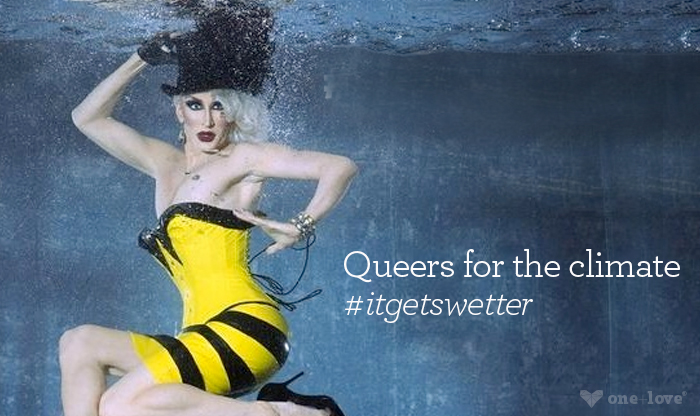
“It Gets Wetter”: Queers for the Climate
It’s our fight too. Patrick Robbins, one of the coordinators of the Queers for the Climate contingent of the People’s Climate March, talks to One+Love a bit about queering the climate change conversation. (As Patrick’s friend put it, “solar powered drag for all.”) Because at these rising temperatures, look, Ma, my intersections are melting.
What have been some of the reactions to your LGBTQ-specific approach to climate action?
I think that the response to our work has been positive, but there is still a lot of work to be done in terms of making the connections between queerness and climate change. It’s a group that contains a rich diversity of viewpoints, and so people have pointed out many different ways in which these social conditions interact — from disproportionate vulnerability to climate change (something I explore in “Heat Crime: LGBTQ Politics for a Changing Climate“) to the ways in which LGBTQ communities have historically understood caretaking to be a political act and understood survival as implying not only basic physical necessities but implying community building as well.
That said, we have gotten resoundingly positive responses for the work we have done – from my colleague Joseph’s hilarious video to the upcoming Queer Climate Chautauqua at the Abrons Arts Center, which lots of folks are really excited about. What’s interesting is that even though there is still that connection-building work to be done, it feels like a lot of people already understand these connections intuitively, at the gut level, and in some ways that’s the most important thing.
Fast-forward 50 years. Queers for the Climate has been in charge of crafting and implementing transformative climate change policy. What does our world look like?
This is such a difficult question, because there is such political diversity within the group, and there’s also so many different levels at which climate policy is formed. As far as a greater vision for the future, I think we imagine one in which respect for our bodies and respect for our environment are understood to be two sides of the same coin — one of climate change’s most troubling aspects is how it threatens biodiversity, paring down and dismantling rich ecosystems that have emerged over millennia. I think there’s a productive analogy there to the respect for emergent cultures, and respect for LGBTQ communities’ autonomy within a larger society. This means a fundamental rethinking not only of our energy system, which drives climate change and destroys ecosystems, but a rethinking of an economic system that puts queer people at risk. From a political standpoint I really do think that tackling one means tackling both.

Recent Comments